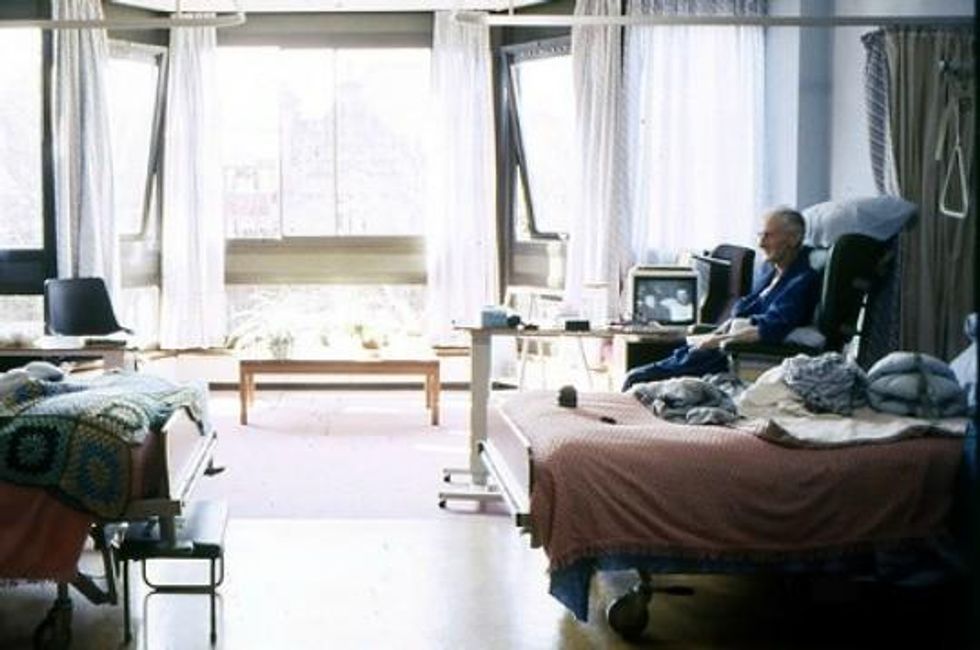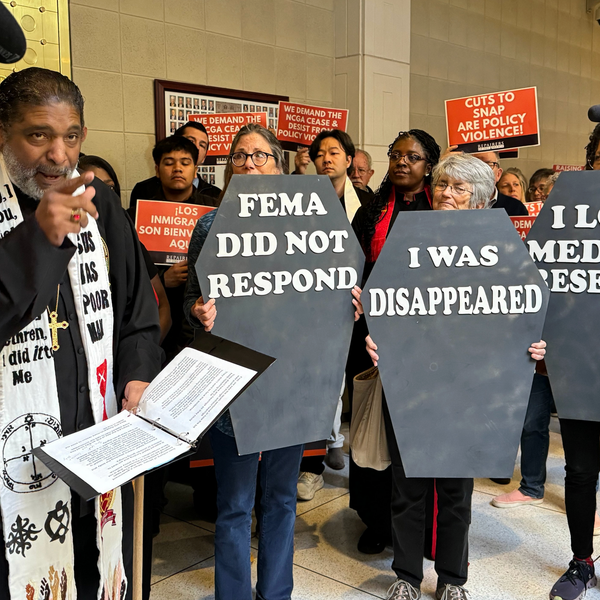Investigation Reveals Rampant Fraud by Privatized Hospice Groups
Siphoning billions of Medicare dollars, for-profit hospice companies found recruiting non-dying patients

Hospice care, which focuses on providing comfort to the terminally ill rather than finding a cure, is funded primarily by Medicare--which makes an estimated 85 to 90 percent of all payments to hospices.
Quick to capitalize on this booming industry, since 2000 the number of hospices run by for-profit companies has jumped from 30 percent to nearly 60 percent--with an even larger share of the patients; during the same period, Medicare expenditures on hospice jumped from $2.9 billion to $15.1 billion.
And as the Post investigation reveals, in order to maximize profits, these for-profit hospice groups have begun aggressively recruiting patients who aren't actually dying.
"Medicare pays a hospice about $150 a day per patient for routine care, regardless of whether the company sends a nurse or any other worker out on that day. That means healthier patients, who generally need less help and live longer, yield more profits," the Washington Post reports.
Painting a picture of an industry that has morphed from merciful to miserly, the Post describes the efforts by companies to recruit new patients:
Hospice "outreach specialists" and "community education representatives" seek out patients in a variety of ways: They solicit doctors and hospitals who might regularly deal with the terminally ill; they make connections at nursing homes, assisted-living developments and Meals on Wheels groups. They show up at the "health fairs" held at senior centers with, for example, machines that test blood pressure. For families struggling to take care of a loved one, they offer the promise of extra help.
At AseraCare, officials gave advice to their recruiters on how to close a deal with families who are "not ready yet" for hospice, according to a company presentation for Alabama employees. It instructed recruiters to "focus families" by stressing the urgency of a decision, and saying things like, "We only have 10 minutes left."
"Effective communication is the transfer of emotion, not information," the presentation said.
Other companies reportedly offered employee bonuses for meeting "new patient" goals and one hospice group in LaGrange, Ga. went so far as to "cruis[e] neighborhoods, looking for elderly people with disabilities."
"It must be strange to be told you're dying and then not die," said Jim Barger, a lawyer in Birmingham, Ala. who has filed a number of suits against these for-profit companies.
According to Barger, while hospice requires that two doctors initially certify that a patient carries a life expectancy of six months or less, afterwards the hospice itself is charged with re-approving their stay.
"It is common knowledge in the industry that a longer length of stay is going to be more lucrative," Rachel Mason, who worked at Delta Hospice in California, told the Post. "If they come in very sick and die right away, it's difficult to run a business that way."
_____________________
An Urgent Message From Our Co-Founder
Dear Common Dreams reader, The U.S. is on a fast track to authoritarianism like nothing I've ever seen. Meanwhile, corporate news outlets are utterly capitulating to Trump, twisting their coverage to avoid drawing his ire while lining up to stuff cash in his pockets. That's why I believe that Common Dreams is doing the best and most consequential reporting that we've ever done. Our small but mighty team is a progressive reporting powerhouse, covering the news every day that the corporate media never will. Our mission has always been simple: To inform. To inspire. And to ignite change for the common good. Now here's the key piece that I want all our readers to understand: None of this would be possible without your financial support. That's not just some fundraising cliche. It's the absolute and literal truth. We don't accept corporate advertising and never will. We don't have a paywall because we don't think people should be blocked from critical news based on their ability to pay. Everything we do is funded by the donations of readers like you. Will you donate now to help power the nonprofit, independent reporting of Common Dreams? Thank you for being a vital member of our community. Together, we can keep independent journalism alive when it’s needed most. - Craig Brown, Co-founder |

Hospice care, which focuses on providing comfort to the terminally ill rather than finding a cure, is funded primarily by Medicare--which makes an estimated 85 to 90 percent of all payments to hospices.
Quick to capitalize on this booming industry, since 2000 the number of hospices run by for-profit companies has jumped from 30 percent to nearly 60 percent--with an even larger share of the patients; during the same period, Medicare expenditures on hospice jumped from $2.9 billion to $15.1 billion.
And as the Post investigation reveals, in order to maximize profits, these for-profit hospice groups have begun aggressively recruiting patients who aren't actually dying.
"Medicare pays a hospice about $150 a day per patient for routine care, regardless of whether the company sends a nurse or any other worker out on that day. That means healthier patients, who generally need less help and live longer, yield more profits," the Washington Post reports.
Painting a picture of an industry that has morphed from merciful to miserly, the Post describes the efforts by companies to recruit new patients:
Hospice "outreach specialists" and "community education representatives" seek out patients in a variety of ways: They solicit doctors and hospitals who might regularly deal with the terminally ill; they make connections at nursing homes, assisted-living developments and Meals on Wheels groups. They show up at the "health fairs" held at senior centers with, for example, machines that test blood pressure. For families struggling to take care of a loved one, they offer the promise of extra help.
At AseraCare, officials gave advice to their recruiters on how to close a deal with families who are "not ready yet" for hospice, according to a company presentation for Alabama employees. It instructed recruiters to "focus families" by stressing the urgency of a decision, and saying things like, "We only have 10 minutes left."
"Effective communication is the transfer of emotion, not information," the presentation said.
Other companies reportedly offered employee bonuses for meeting "new patient" goals and one hospice group in LaGrange, Ga. went so far as to "cruis[e] neighborhoods, looking for elderly people with disabilities."
"It must be strange to be told you're dying and then not die," said Jim Barger, a lawyer in Birmingham, Ala. who has filed a number of suits against these for-profit companies.
According to Barger, while hospice requires that two doctors initially certify that a patient carries a life expectancy of six months or less, afterwards the hospice itself is charged with re-approving their stay.
"It is common knowledge in the industry that a longer length of stay is going to be more lucrative," Rachel Mason, who worked at Delta Hospice in California, told the Post. "If they come in very sick and die right away, it's difficult to run a business that way."
_____________________

Hospice care, which focuses on providing comfort to the terminally ill rather than finding a cure, is funded primarily by Medicare--which makes an estimated 85 to 90 percent of all payments to hospices.
Quick to capitalize on this booming industry, since 2000 the number of hospices run by for-profit companies has jumped from 30 percent to nearly 60 percent--with an even larger share of the patients; during the same period, Medicare expenditures on hospice jumped from $2.9 billion to $15.1 billion.
And as the Post investigation reveals, in order to maximize profits, these for-profit hospice groups have begun aggressively recruiting patients who aren't actually dying.
"Medicare pays a hospice about $150 a day per patient for routine care, regardless of whether the company sends a nurse or any other worker out on that day. That means healthier patients, who generally need less help and live longer, yield more profits," the Washington Post reports.
Painting a picture of an industry that has morphed from merciful to miserly, the Post describes the efforts by companies to recruit new patients:
Hospice "outreach specialists" and "community education representatives" seek out patients in a variety of ways: They solicit doctors and hospitals who might regularly deal with the terminally ill; they make connections at nursing homes, assisted-living developments and Meals on Wheels groups. They show up at the "health fairs" held at senior centers with, for example, machines that test blood pressure. For families struggling to take care of a loved one, they offer the promise of extra help.
At AseraCare, officials gave advice to their recruiters on how to close a deal with families who are "not ready yet" for hospice, according to a company presentation for Alabama employees. It instructed recruiters to "focus families" by stressing the urgency of a decision, and saying things like, "We only have 10 minutes left."
"Effective communication is the transfer of emotion, not information," the presentation said.
Other companies reportedly offered employee bonuses for meeting "new patient" goals and one hospice group in LaGrange, Ga. went so far as to "cruis[e] neighborhoods, looking for elderly people with disabilities."
"It must be strange to be told you're dying and then not die," said Jim Barger, a lawyer in Birmingham, Ala. who has filed a number of suits against these for-profit companies.
According to Barger, while hospice requires that two doctors initially certify that a patient carries a life expectancy of six months or less, afterwards the hospice itself is charged with re-approving their stay.
"It is common knowledge in the industry that a longer length of stay is going to be more lucrative," Rachel Mason, who worked at Delta Hospice in California, told the Post. "If they come in very sick and die right away, it's difficult to run a business that way."
_____________________

